Jeff Beal has been composing film music since 1988, and has been involved in more than 120 projects. These include not only featured films (such as the two arrangements of Ed Harris called Pollock and Appaloosa) or documentaries (Blackfish), but also scores for worldwide popular television series like House of Cards, Monk, Rome, Carnivale or Tom Selleck's Jesse Stone. We asked him about these projects, and also his concert works.
You have previously given many concerts, and this year April and May it will also be a few. How important is it to have film soundtracks represented during your concerts?
I believe a great concert should have great music, period. The idea the music from a film or TV series can be excellent and deserve a place in a concert hall is very important to me. Projects such as my House Of Cards in Concert program can also function as a way of introducing new listeners to a live symphonic experience, which I love. It's all about not putting up false walls as to what deserves to be celebrated in a concert – this wonderful trend of film music coming to the concert hall is needed to keep the literature of performed music relevant and meaningful for an audience in 2017. But having said that, I've just come from Chicago where some of my choral works were performed by the Apollo Chorus, and now I'm in New York for another premiere of a new work for the Brooklyn Youth Chorus. Our tour actually started with a visit to Portland Oregon for a dress rehearsal of my ballet Terra with Helen Pickett.
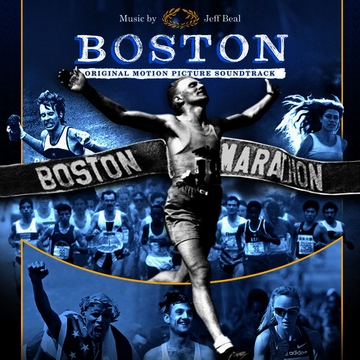 In this tour's line up you have the world premier of the Boston documentary in which Boston Pops Esplanade Orchestra worked with you.
In this tour's line up you have the world premier of the Boston documentary in which Boston Pops Esplanade Orchestra worked with you. This was a thrill! The Boston Symphony is one of the great orchestras of the world, and their history of collaborations and premieres of seminal works in the 20th Century is well known. To be able to record them for our score, and to premiere the film with the score played live in Boston with the Pops Esplanade was a dream come true. Our documentary is not just about the Boston bombing of 2013. Although that is in our film, Boston is more of a historical celebration of the 100 plus year history of this race. I wanted the score to celebrate the resilience of Bostonians, marathon runners, and the sense of excellence that to me represents the spirit of the people of Boston. There are themes of Americana, Irish Celtic, Romantic, Greek, and of course lots of rhythm and excitement. But it's also a very symphonic score. I wanted the orchestra to become a "character" in the film, so I was much more detailed and expansive in my use of orchestration with this work. On one level, I wanted to create a score which could also feel as it was a symphony of it's own. We also had a lot of score in the film – about 90 minutes, so the expanse and opportunity for variations and arc in the music also felt very symphonic to me.
What kind of preparation and how much time was needed for an event like House of Cards in Concert to come about? What were the deciding factors in your choice for which songs would be heard from the many hours of music?
A lot! This program was really my creation from the beginning. We workshopped a 53 minute version in 2015, and premiere the full evening (85 minutes) at the Kennedy Center in Washington D.C. with the National Symphony. I went through the music from season 1,2,3,4 and picked some of my favorite themes, and create new symphonic "suites". This ten-moment structure was designed to have a fulfilling arc and build to it. I also did all of the video editing to create the visual montages which are choreographed to the music. Seeing the phenomenal response to our concerts in Europe and the U.S. makes me want to bring it to more orchestras and cities. If someone had told me we would premiere this at the Kennedy Center in the U.S. and a few months later I'd be giving the European premiere at the Concertgebouw in the Netherlands, I probably wouldn't have believed you!
The music, which I've called House of Cards Symphony will also be recorded for BIS records this July in Sweden. I'm looking forward to documenting that and sharing the orchestrations in recorded form.
And if we are speaking of House of Cards, then it must be said that you contributed to the succsessof the 2013 Netflix series.
I'm very proud of this show. When you do a film score, you first job is always to serve the film-making and the story, but I've felt over the years, that this show has really given me an opportunity to write music closest to my own "voice" as a composer – things I enjoy exploring in my concert music. The sensibility of drama, complex emotions and moods is so rich and it comes from so many brilliant people bringing the A game to this. I spend a lot of time looking for opportunities to work with artists who's work I admire and get inspired by. In this case working with David Fincher, and getting to score so many hours of Kevin Spacey's acting has been an incredible gift and honor. We don't also hit home runs; there is a spirit of experimentation and risk which I love about working on this show. I feel like it brings out the best in me and many of the other collaborators, and audiences over the world have really embraced it.
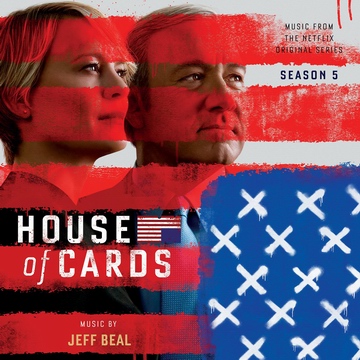 The House of Cards season five music will be out soon. Are you apart of the making of this album or is it entirely up to the record company?
The House of Cards season five music will be out soon. Are you apart of the making of this album or is it entirely up to the record company?Yes – this is something I do personally. I've just finished curating the music for the season five soundtrack, which will be coming out as soon as we can get it out to our fans. Every season I create about six hours of music, and finding the new material that creates a nice addition to our House of Cards musical catalog is always like a giant jigsaw puzzle.
You have made music for many TV shows. What are the criteria for you to take on the music of a series? Do you worry that you won't have time for film scores or other projects?
I've been very lucky, and right now, it's not only finding time for more feature films, but also for my new career as conductor and concert composer! Every year is a struggle to balance all of these, and this is why, compared to some other successful TV composers, I tend to not have as many series going at once as some of they do perhaps.
The biography film Pollock came out in 2000. Are your inspirations different in the making of music for a film which is based on real life events as opposed to fiction?
I love the historical "docu-drama" type of film. These stories are grounded in reality, which often provides great drama if the subject and script are well made. But really, the line between fictional film making and docudrama (and pure documentary films) seems to be blurring and converging in great ways. In fact this year, I have a new feature from Rob Reiner (Shock & Awe) a 4 hour documentary from Oliver Stone Conversations with Putin and the sequel to An Inconvenient Truth from Al Gore, coming to theaters this July. And of course more House of Cards seasons.
Nowadays there are few Westerns made, but you are among the few who could immerse themselves into this musically unique world. Ed Harris directed Appaloosa, as well as Pollock. Is it easier to work with and get your ideas across to a director who is also an actor, or not?
I love Ed Harris and working on both of his features was a great honor. In the case of Pollock it was a dream gig for a composer, and I owe a lot to Mr. Harris and the film exposing my work to a much wider audience. I love actors – the best ones make some of the best directors. I've also worked with Al Pacino on Wilde-Salome and Rob Reiner. In each case I find this collaboration with an actor/director very fluid and fun. They seem to understand the creative dance so well, and also the mystery of it, and need to explore, take risks, and search for the jewels that are buried in the material.
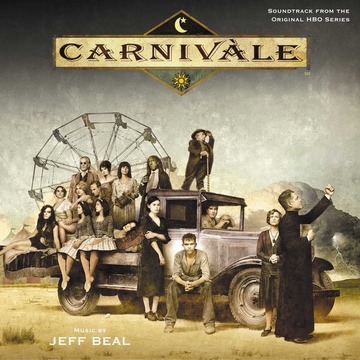 The Carnivale series also brought and interesting world before viewers. How did you approach the creation of this series musical moods?
The Carnivale series also brought and interesting world before viewers. How did you approach the creation of this series musical moods? I loved doing this show! Not specifically, mostly because there wasn't time! I was hired as a replacement composer and they sent me the first 3 episodes and we were in hurry-up mode. Luckily I had done some demos for HBO in an earlier audition for this series, so I was able to go back to some of these early sketches to begin. Carnivale was very much about myth and magic, and this wonderfully strange take on Americana, so I tried to channel all of that through my musical approach. Solo instruments and a "hand made" feel became very important to the sound, as if you could really feel the dust, and desolation of these people.
It is speculated that Carnivale ended well before the creators intended it to. Did you still have any musical ideas that you would have used in the series? Or were you not that far ahead in production?
Much too soon! I was lucky to be on two great HBO series (also Rome) which both ran only two seasons, and could have run much longer. I think in each case and in retrospect, the HBO of 2017 might not pull the plug so soon on either. I was heartbroken to see Carnivale end after only two season. According to Dan Knauf, our creator, he had mapped out for more seasons. Seasons 1 and 2 were "book one" of a 3 "book" structure. I would have loved to see where he took this story and there characters. I hadn't really started themes for new seasons, so what I had done, was where the writing ended up.
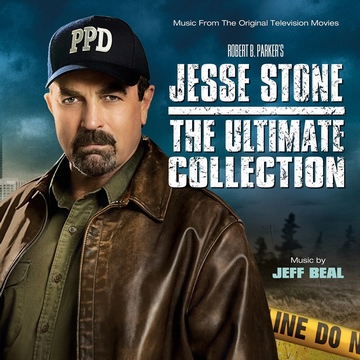 The Jesse Stone films were based on Robert B. Parker's popular characters and were directed by Robert Harmon. Did you come across any major differences between the episodes, in time constraints, directorial instructions or requirements?
The Jesse Stone films were based on Robert B. Parker's popular characters and were directed by Robert Harmon. Did you come across any major differences between the episodes, in time constraints, directorial instructions or requirements?We've been so lucky to have the same filmmaker, Robert Harmon on almost all of our Jesse Stone films. The sensibility we've developed for these stories and films is so much a product of Robert and myself, along with Tom and Michael Brandman. We all love this character and story so much. Each film has always had its challenges, which is usually finding the most graceful and poetic way into the story emotionally. Although there is a procedural crime-mystery element, the Jesse Stone films always work from an emotional character approach which is at times like walking on egg shells. Tom Selleck is so quiet and dignified, not unlike some of the great leading men of more old fashioned films like Bogart or Carey Grant, and finding a way to support his performance is something we work very hard to do well.
2017 will see the release of the 10th episode. Will there come a time where you may not take on anymore Jesse Stone films? Or do you like the character so much that this is inconceivablehetetlen?
Honestly, I don't know – it would be hard not to do one of these, and I know even if I couldn't officially compose the whole score, my themes would be used. A lot of what we've done over the years has been to feather in some of the important thematic threads in each of the movie in different ways.
Not just with the Jesse Stone films but many other times you have worked with your wife Joan. Do you work together on a theme or does she co-create as a singer only?
Joan is a great improviser, and several times we'll work together in the studio to develop her parts. This was especially true on shows such as Carnivale or The Dove Keepers. For the more operatic parts she's done, such on House of Cards I've written out her parts.
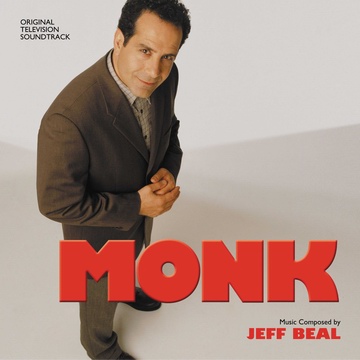 You worked on the Monk's music from the beginning, but in the end the creators used the Randy Newman "It's a Jungle Out There" as the theme song. What was the reason for this?
You worked on the Monk's music from the beginning, but in the end the creators used the Randy Newman "It's a Jungle Out There" as the theme song. What was the reason for this?To be honest, I don't know! I love Randy Newman, but in this case, I think the producers made a real mistake with such a drastic change. My best guess is that one of our executive producers didn't like my theme. I feel winning my first Emmy for that theme speaks for itself in terms of validating that opinion.
Besides film scores you have composed concert pieces, chamber music and ballets. With such a wide range are there any music styles that you have not tried but you would like to?
Yes, an Opera, and musical theater. I love both of these genres. Early stages on an idea for an Opera, but it's a big task which will take a few years to realize, but it's next on my list.
You are not only known as a composer but as the mentor of young talents. How do you see the future of film music and the new generation of composers?
Very important. Part of the reason we made our gift to the Eastman School was that I believe the "composer of the future" will be one whom is well versed in writing music of the highest quality, the ability to write for film and media will be part of their toolkit! I love teaching and sharing my ideas through master classes and presentations. Even though film music is partly "commerce" some of the best musical minds and composers and writing it. I actually feel like Los Angeles is much like Vienna in the 19th and early 20th centuries. It's the place where the most innovation an greatest talents are gravitating towards. My passion for film music also extends to the other aspects I touched on above, regarding giving the concert audiences of the future new repertoire, and making sure film music attracts and celebrates excellence and innovation, musically speaking.
To know more about Jeff Beal's work, please visit the composer's official website.
Special thanks to Beth Krakower
July 10th, 2017
July 10th, 2017








